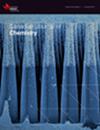单分子水和双分子水对BrO + CH2O反应的影响
IF 1
4区 化学
Q3 CHEMISTRY, MULTIDISCIPLINARY
引用次数: 0
摘要
通过机理和动力学研究,探讨了水分子对BrO + CH2O反应的催化作用。在CCSD(T)/aug-cc-pVTZ//B3LYP/cc-pVTZ水平上研究了BrO + CH2O反应的势能面和动力学性质。该反应分别通过4条无水途径和9条有水途径生成4种不同的产物。结果表明,HCO + HOBr的生成占据了整个反应过程,不需加水。采用基于过渡态理论和Wigner隧道修正的kishelp程序计算速率常数。裸反应的速率常数低于单分子水存在时的速率常数,而高于双分子水存在时的速率常数。目前的计算表明,单分子水可以加速BrO + CH2O反应,而双分子水不能加速BrO + CH2O反应。有效速率常数(单分子水和双分子水存在时)远低于裸反应。本文章由计算机程序翻译,如有差异,请以英文原文为准。
The influence of monomolecular water and bimolecular water on BrO + CH2O reaction
The catalytic influence of water molecules on BrO + CH2O reaction was discussed through the investigation of mechanism and kinetics. The potential energy surfaces and dynamic properties of the BrO + CH2O reaction were investigated at the CCSD(T)/aug-cc-pVTZ//B3LYP/cc-pVTZ level. The reaction generates four different products, respectively, through four pathways without water and nine pathways with water. The results have shown that the generation of HCO + HOBr occupied the entire reaction without water. The rate constants were obtained by employing the KisThelP program based on the Transition State Theory with Wigner tunneling correction. This rate constants of the naked reaction are lower than that in the presence of monomolecular water and are higher than that in the presence of bimolecular water. The current calculations indicated that monomolecular water could accelerate the BrO + CH2O reaction, while bimolecular water could not accelerate the BrO + CH2O reaction. The effective rate constants (in the presence of monomolecular water and bimolecular water) are much lower than that of the naked reaction.
求助全文
通过发布文献求助,成功后即可免费获取论文全文。
去求助
来源期刊

Canadian Journal of Chemistry
化学-化学综合
CiteScore
1.90
自引率
9.10%
发文量
99
审稿时长
1 months
期刊介绍:
Published since 1929, the Canadian Journal of Chemistry reports current research findings in all branches of chemistry. It includes the traditional areas of analytical, inorganic, organic, and physical-theoretical chemistry and newer interdisciplinary areas such as materials science, spectroscopy, chemical physics, and biological, medicinal and environmental chemistry. Articles describing original research are welcomed.
 求助内容:
求助内容: 应助结果提醒方式:
应助结果提醒方式:


